Kurdish Dissident Accuses Iran Of Assassination Attempt Against Comrade
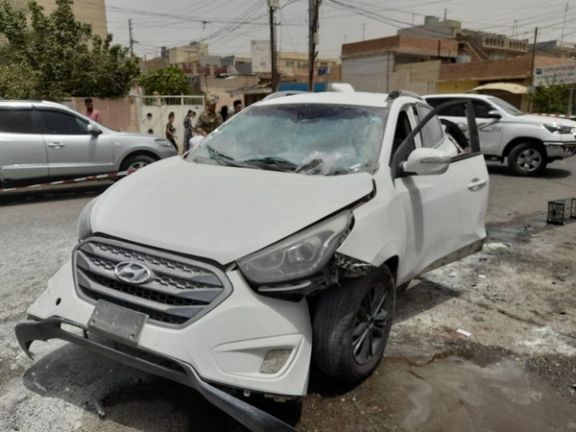
A senior member of the Organization of the Iranian Kurdistan Struggle has accused the Islamic Republic of being behind an assassination attempt on fellow fighter Akbar Sanjabi.

A senior member of the Organization of the Iranian Kurdistan Struggle has accused the Islamic Republic of being behind an assassination attempt on fellow fighter Akbar Sanjabi.
Shoresh Haji, a member of the governing committee of the opposition group – known as Khabat that is the Kurdish word for "struggle" -- told Iran International on Tuesday that the former political prisoner, 49, was injured when a bomb that was attached to his car detonated in Erbil, the capital of the Kurdistan Region in Iraq on Monday.
He called the attack a terrorist act, and called on the Iraqi Kurdistan Region security agencies to conduct an extensive investigation into the assault.
The political activist, who was severely injured in the left leg and was taken to Erbil’s Emergency Medical Center, had been sentenced to life in prison by Iranian authorities for membership in the Albania-based opposition group Mujahedin-e-Khalq (MEK) organization. While on a temporary leave, Sanjabi left the country and settled in Erbil.
In 2021, two political activists and members of the Kurdistan Free Life Party (PJAK) and the Democratic Party of Iranian Kurdistan (KDPI), Behrouz (Rebin) Rahimi and Musa Babakhani, were assassinated in the cities of Sulaimaniyah and Erbil.
Although the Islamic Republic has not claimed responsibility for any of these assassinations, their respective parties have blamed the Iranian government for the attacks.
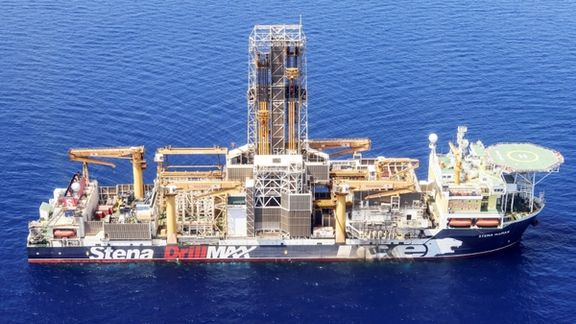
International energy politics upturned by US and European sanctions against Russia took a further twist Monday as the Lebanese party Hezbollah threatened force against Israel.
Deputy leader Naim Qassem told Reuters that Hezbollah was ready for action against Israeli gas operations in disputed sea waters, a day after a London-based vessel operated by drilling company Energean arrived at Israel’s bidding to develop the Karish gas field.
Energean, which is listed in London and Tel Aviv, said its floating production storage and offloading vessel was set up 80 km (50 miles) west of Haifa and would be operational by the third quarter of 2022.
Qassem said Hezbollah would act only with the authorization of the Lebanese government, which has warned Israel against the offshore work. Beirut said Monday that with discussions stalled for a year it would now invite Amos Hochstein, a United States mediator, to help resolve matters. Lebanon and Israel have no diplomatic relations.
“When the Lebanese state says that the Israelis are assaulting our waters and our oil, then we are ready to do our part in terms of pressure, deterrence and use of appropriate means – including force,” Qassem said.
“The issue requires a decisive decision from the Lebanese state,” he added, and that Hezbollah “urged the government to hurry up, to set a deadline for itself.” Qassem said Hezbollah would act even at the risk of a wider conflict with Israel.
Preventing escalation
Lebanon hopes offshore gas reserves could alleviate its chronic financial problems, including one of the world’s largest public debts, but is currently struggling to form a government after parliamentary elections last month.
Caretaker Prime Minister Najib Mikati wrote on Twitter that the government aimed at “completing the negotiations to demarcate the southern maritime border and to work on concluding the issue as fast as possible to prevent any escalation that would not serve the state of stability in the region.” Mikati said any Israeli drilling or exploration in a disputed area was “a provocation and an act of aggression.”
With several gas discoveries made in the 2000s in the eastern Mediterranean and Lebanon slow to exploit the resource, there is a significant area where Israel and Lebanon dispute the border.
In a statement on Sunday, the Lebanese presidency said Lebanon had written to the United Nations that Karish was within the disputed area, but Israeli Energy Minister Karine Elharrar told Tel Aviv radio 103 FM there was “unequivocally no” encroachment by Israel.
“Everything to do with the dispute will be resolved in the framework of negotiations between us and Lebanon, mediated by the United States,” Israeli Defense Minister Benny Gantz said in televised remarks.v
While Lebanon and Israel have not been involved in a major conflict since 2006, the fall in Russian energy exports, including both gas and oil, has pushed up world energy prices and increased the attraction of moving ahead with new projects.
Iran, which according to the BP 2021 Statistical Review of World Energy, has the world’s second largest gas reserves, after Russia, and the third largest oil reserves, is closely aligned to Hezbollah. Some analysts suggest Iran has an opportunity to increase its own energy exports, especially to Europe, assuming US sanctions are lifted with restoration of the 2015 Iran nuclear deal, the JCPOA (Joint Comprehensive Plan of Action).
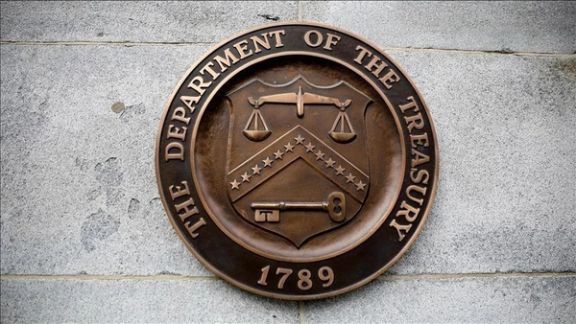
The US Treasury Department has sanctioned 16 individuals and groups affiliated with terrorist organizations, including three associated with Iran’s Revolutionary Guards' Quds Force.
The Terrorist Financing Targeting Center of the Office of Foreign Assets Control at the Department of the Treasury on Monday targeted a broad range of financiers of terrorism from a variety of regional terrorist designated organizations, including two groups affiliated the IRGC, whose “goal is to pave the way for Iran to exert greater influence in Bahrain and beyond.”
“The targets included three individuals associated with Iran’s Islamic Revolutionary Guard Corps Qods (Quds) Force, four ISIS-associated individuals and one company, six Boko Haram financiers, and terrorist groups Saraya al-Ashtar and Saraya al-Mukhtar,” read the treasury’s statement.
According to the treasury, Ali Qasir, Meghdad Amini, and Morteza Hashemi are part of two networks directed by and providing financial support to the Quds force and its Lebanese proxy group Hezbollah. The complex networks of intermediaries allow the Quds Force to obfuscate its involvement in selling Iranian oil.
Amini and Qasir are financial facilitators who direct a network of nearly 20 individuals and front companies, located in multiple countries, that has facilitated the movement and sale of tens of millions of dollars’ worth of gold, electronics, and foreign currency. Hashemi controls multiple companies based out of Hong Kong and mainland China and has used his access to the international financial system to broker contracts aimed at laundering vast sums of money.
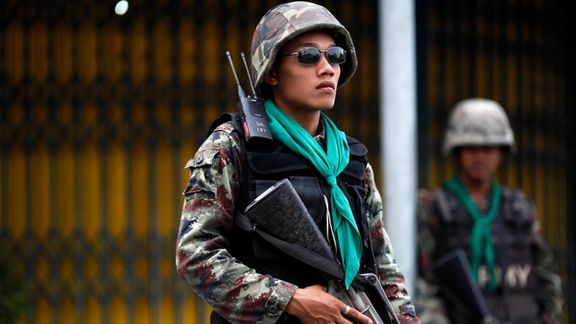
Following warnings that Iran was planning attacks on Israeli citizens in various parts of the world, Thailand’s police have are on high alert to find the Islamic Republic’s agents.
A police source told the Bangkok Post on Monday that the Royal Thai Police (RTP) has issued a secret order to officers across the country to keep an eye out for spies from Iran believed to be in the region after one was arrested in Indonesia last year.
According to the source, security agencies are closely monitoring the movements of Iranian nationals and gathering intelligence about some Shiite Thai Muslims who are suspected to be working as the Islamic Republic’s agents.
The source said the order cited an incident in May last year when Indonesian authorities were tipped off that a man named Ghassem Saberi Gilchalan arrived in the country carrying a fake Bulgarian passport.
He was arrested just before departing for Qatar, and was sentenced to two years in jail. Police found that he entered the country more than 10 times using false papers and had 11 mobile phones with the names of some Thai Muslims saved on them.
Following interrogations, Gilchalan confessed that he had been given several assignments by a former Iranian diplomat in Malaysia to act as a spy both there and in Indonesia several times, the latest of which involved lobbying Indonesian authorities to release the Iranian-flagged MT Horse oil tanker apprehended there January last year.

In May, an Israeli informed source told Iran International that security measures are tight around the Israeli embassy in the Indian capital New Delhi reportedly over a serious possibility of an attack by Iran-backed elements.
Late in May, President Ebrahim Raisi said Iran will “definitely” take revenge for the spectacular assassination of Revolutionary Guard Qods (Quds) Force colonel Hassan Sayyad-Khodaei in Tehran. Sayyad-Khodaei, who Israeli media say was the acting commander of an elite Qods Force unit, Unit 840, was shot dead behind the wheel of his car by two gunmen who fled the scene on a motorbike.
A few days later, Fars news website in Iran affiliated with the IRGC published an article profiling several Israeli businesspeople, using thinly veiled threatening language.
Moreover, conflicting reports are still circulating about the death of Iranian aerospace scientist Ayoob Entezari -- who held a PhD in mechanical and aerospace engineering -- with some calling it an assassination and government saying he died of food poisoning.
Reports about Entezari’s fate came a day after Iran confirmed the death of a colonel from the Quds Force, Ali Esmailzadeh of the Islamic Revolutionary Guard Corps. Iranian government and IRGC media said that Col. Esmailzadeh died “in an incident in recent days” at his home without mentioning any details after Iran International quoted sources in Iran as saying that the IRGC killed him over suspicions of espionage.
Last week, Israel issued a warning to citizens traveling or planning to travel to Turkey that they could be targeted by Iranian operatives seeking to avenge the recent assassination. The National Security Council explicitly identified “Iranian terrorist operatives” as being the source of the threat to Israelis in Turkey and nearby countries. Israel’s Channel 12 news reported on Sunday that Israel is considering expanding the travel warning to additional countries.
Early in May, a short audio recording was published by Israeli media with a photo of a man introduced as Iranian national Mansour Rasouli, 52. In the audio recording, Rasouli says he was sent to Turkey by the Revolutionary Guards (IRGC) to establish an operational network to assassinate an Israeli diplomat in Istanbul, a Germany-based US general, and a journalist in France.
Later in May, Israel’s security agency Shin Bet uncovered an alleged plot by Iranian intelligence to lure Israeli academics and former defense officials to travel abroad in order to kidnap them. The Iranian operatives used the stolen identities and relevant cover stories in an attempt to gather intelligence about Israelis and to invite them to locations abroad -- some under the guise of a conference -- in order to abduct or harm them.
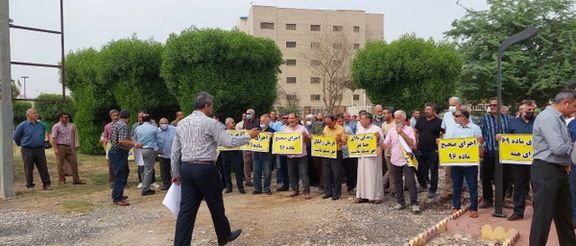
Iranian retirees held demonstrations Monday in several cities across the country to protest the meager rise in their pensions while the inflation rate is hovering over at over 40 percent.
The pensioners took to streets in the capitals of many provinces such as Tabriz, Gilan, and Kermanshah, while several cities across the southwestern oil-rich Khuzestan province, including Ahvaz, Dezful, Abadan, and Shushtar, were also scenes of similar protests.
The enraged protesters chanted slogans such as “Death to Raisi” and "Shame on you incompetent minister”, against the government and “empty promises” by authorities.
Retirees are demanding pension increases in par with rising prices of essential foods, saying that the current payments are not in line with decrees by the Supreme Labor Council, which had stipulated a 38-percent increase in the minimum wage.
The protests occurred as the government spokesman Ali Bahadori Jahromi said in a tweet on Sunday that the minimum wage for retirees covered by the Social Security Organization has risen by 57 percent, calling it “one of the largest increases in 20 years and nearly 20 percent above the official inflation rate.”
With food prices rising faster after four years of United States’ ‘maximum pressure’ sanctions, Iranian workers and retirees and workers have been holding regular protests or strikes to demand higher salaries.
Moreover, the collapse of a ten-story Metropol building in Abadan in May has sparked anti-government rallies that have spread to other cities in the southwestern Khuzestan province and elsewhere.
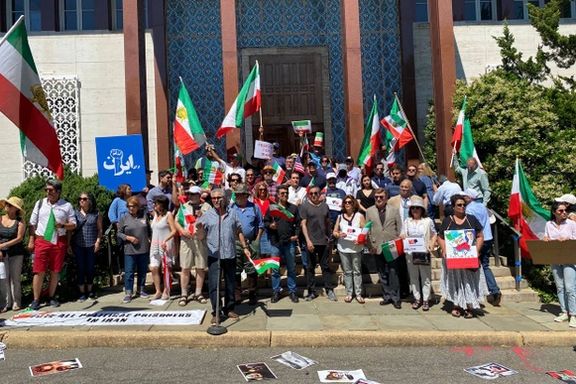
Iranian expatriates in the United States and Canada held gatherings in Washington DC and Toronto on Sunday to express support for popular anti-regime protests in Iran.
The Washington protest was held at the former building of the Iranian embassy and called by dissident singer-songwriter Arash Sobhani, a blues musician who has been an active advocate of human rights and democracy in Iran and has delivered speeches about Iranian social issues in various universities, including Harvard, Stanford, and University of California Irvine.
During the event, Sobhani performed some of his original works, which are usually themed around the cultural and political issues in the Islamic Republic, as well as some cover songs about Iran, which were accompanied by the participating crowd.
The gathering in Toronto was organized by Hamed Esmailioun, who is the flagbearer for the victims of the downing of Ukrainian Airlines Flight PS752 in January 2020 by the Revolutionary Guard, where he himself lost his wife and daughter.
"Iran is ruled by the turban-wearing criminals and bloodthirsty revolutionary guards," Esmailioun said during his speech at the demonstration.
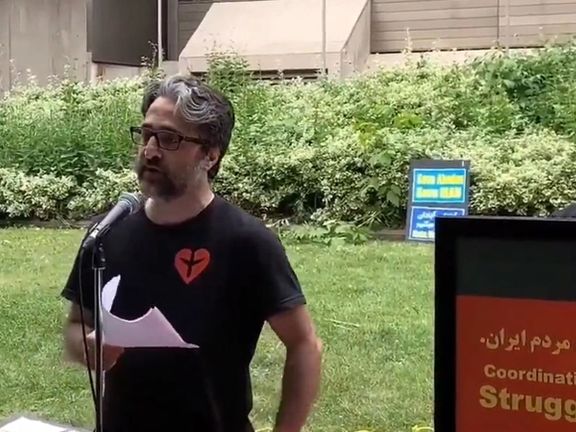
In both gatherings, people expressed solidarity with the people of Abadan, whose mourning ceremonies for the victims of the collapsed ten-story Metropol twin towers in May have turned into anti-government protests and spread to other cities of the southwestern Khuzestan province as well as other cities across the country.
“Although we tremble from sorrow but abound with anger; our heart is with you Abadan and we will not let them trample on the truth,” Esmailioun added.